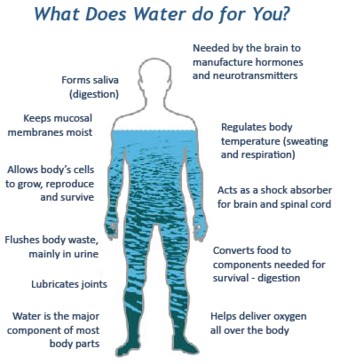Water is essential for life, and it plays a crucial role in almost every bodily function. From regulating temperature to transporting nutrients, water is indispensable for our survival and well-being. But just How Much Water Is In The Human Body? The answer might surprise you, and it varies depending on several factors.
 Graphic showing what water is for in a human body.
Graphic showing what water is for in a human body.
The General Percentage of Water in the Human Body
On average, water makes up about 55% to 60% of an adult human body. This means that if you weigh 150 pounds, approximately 90 pounds of that weight is water! However, this is just a general average. The actual percentage can fluctuate based on age, sex, and body composition.
Water Percentage in Different Body Parts
It’s not just about the overall percentage; water is distributed unevenly throughout the body. Different organs and tissues have varying water concentrations:
- Brain and Heart: These vital organs are among the most water-rich, containing around 73% water. This high water content is crucial for their function and resilience.
- Lungs: Our lungs, responsible for oxygen intake, are composed of about 83% water. This moisture is essential for the gas exchange process.
- Skin: The skin, our largest organ, is made up of approximately 64% water. Water helps maintain skin elasticity and a youthful appearance.
- Muscles and Kidneys: These active tissues are about 79% water. Water is vital for muscle function and kidney filtration.
- Bones: Even bones, which seem solid, contain a significant amount of water, around 31%. Water contributes to bone strength and structure.
Factors Affecting Body Water Percentage
Several factors influence the amount of water in your body:
- Age: Infants have the highest percentage of body water, around 78% at birth. This percentage decreases with age, dropping to about 65% by one year old. Older adults tend to have a lower water percentage compared to younger adults.
- Sex: Generally, men have a slightly higher percentage of body water (around 60%) than women (around 55%). This difference is primarily due to body composition.
- Body Fat: Fat tissue contains less water than lean muscle tissue. Since women typically have a higher percentage of body fat than men, they tend to have a lower overall body water percentage. Individuals with more fatty tissue will have a lower percentage of body water compared to those with less fat.
Why is Water So Important in the Human Body?
Water is not just a filler; it performs numerous essential functions that keep us alive and healthy:
- Nutrient Transport: Water in the bloodstream is crucial for transporting carbohydrates, proteins, vitamins, and minerals to cells throughout the body.
- Waste Removal: Water assists in flushing out waste products through urine, sweat, and bowel movements, detoxifying the body.
- Temperature Regulation: Water helps regulate our internal body temperature through sweating and respiration. Evaporation of sweat cools the body down, preventing overheating.
- Lubrication: Water lubricates joints, allowing for smooth movement and reducing friction. It also forms saliva, which is essential for digestion.
- Shock Absorption: Water acts as a shock absorber, protecting sensitive organs like the brain, spinal cord, and fetus from injury.
- Cellular Function: Water is vital for every cell in the body, acting as a building material and solvent for chemical reactions.
Staying Hydrated for Optimal Body Water Levels
Maintaining adequate hydration is crucial for ensuring all these bodily functions operate efficiently. The daily water requirement varies based on factors like activity level, climate, and overall health. While drinking liquids is essential, remember that we also get water from the foods we consume.
Understanding how much water is in the human body and its vital roles highlights the importance of staying properly hydrated. By drinking enough water throughout the day, we support our body’s natural processes and contribute to overall health and well-being.
Sources and Further Reading:
- Mitchell, H.H., Hamilton, T.S., Steggerda, F.R., and Bean, H.W., 1945, The chemical composition of the adult human body and its bearing on the biochemistry of growth: Journal of Biological Chemistry, v. 158, issue 3, p. 625-637.
- Environment Canada, The Nature of Water.
- Project WET, Hydration Activities (PDF).